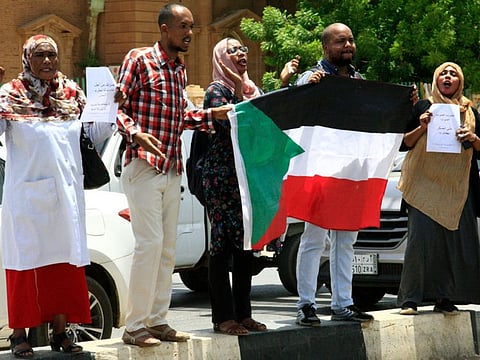Media and the new wave of Arab protests
Unrest in Sudan and Algeria was covered without hype, so there was no violence

Popular protests forced Algerian President Abdul Aziz Bouteflika to resign and decide against seeking a fifth term. Similar protests in Sudan against President Omar Al Bashir didn’t get wide coverage in Arab mainstream media. The easy explanation is that media reflects people’s sentiment in the region as uprisings in 2011 and after paved the way for chaos in Tunisia, Egypt, Libya, Syria and Yemen. The unsavoury episodes must be fresh in people’s memory. The lessons may have prompted them to avoid creating a vacuum by bringing the state down.
So did the media reflect popular sentiment? One has to be sceptical. Objectivity is relative when it comes to mainstream media, but neutrality and impartiality are out of the question. Media coverage of politics tends to be slanted, although it can be relatively objective. You can effortlessly perceive the slant of Arab television news channels and non-Arab channels broadcasting in Arabic. Political slant need not necessarily damage credibility, but lack of objectivity can be very harmful.
Is a truly free and fully impartial media a myth? Which country has a fully free media? Even American media, which is privately owned, either self-censors on national interest issues or toes the line to protect the business interests of its owners.
Demagogic propaganda is another issue. It applies to outlets that can be labelled as mouthpieces of certain ideological or zealous groups: Such as Al Jazeera and Ikhwan (Muslim Brotherhood) and its terrorist offshoots. Other outlets might claim to be reporting news from an angle consistent with the interests of its owners — private or governmental. So professionalism goes out of the window — in some cases, journalists become ‘More Catholic than the Pope’.
The protests in Sudan and Algeria need further evaluation — on the nature of the unrest and the forces behind it. Like all uprisings, the goal was political change. But the Sudanese and Algerians learnt a lesson from the mistakes of Syria, Libya and others. They want change without chaos or dissolution of state institutions. There’s no traditional opposition force behind these protests, at least it was not very apparent.
The coverage of the protests posed different dilemmas for mainstream Arab media. For example, Al Jazeera found itself in an awkward position while covering Sudan as Al Bashir claimed the legacy of the Islamist movement that helped him to power. Islamists in Sudan are in a difficult situation themselves and couldn’t decide whether to stay with the regime or ride the protest wave. That’s why you didn’t see extended live coverage of protests in the streets of Khartoum or the type of vulgar opinion shows Al Jazeera used to broadcast about Egypt in 2011.
For fear of propagating dissent
As for other outlets that don’t favour Ikhwan, they refused to cover the uprisings elaborately for fear of propagating dissent.
Algeria was a bit different, mainly because North African countries are not of much interest for the mainstream Middle Eastern media. But the news can’t be ignored, and since the rest of the region is ‘neutral’ towards the regime and the opposition, the media coverage too was moderate.
The same trend applies, in varying degrees, to foreign outlets broadcasting in Arabic. Apart from Russia Today (RT) and France 24, the rest are trying to gain an edge over Arab outlets. American Al Hurra and British BBC Arabic have increased their coverage, but given the perception among Arab audience, it is safe to assume that the western media hasn’t been able to raise its viewership.
France 24 has a special interest in Algeria, and Arabic RT is sensational in its coverage and finds these events a good opportunity to pursue their approach.
Despite the slants in the coverage of unrest in Sudan and Algeria, a positive outcome for the Arab audience is that the news was reported without hype. Avoiding media propaganda and mobilisation (like Al Jazeera did in Egypt, Syria, Libya and other countries in 2011) helped keep the protests peaceful with little bloodshed or violence.
Dr Ahmad Mustafa is an Abu Dhabi-based journalist.



